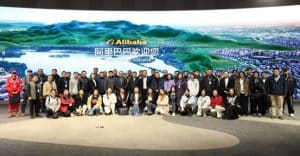In 2008, the year of the Wenchuan earthquake struck, many volunteers suddenly made an appearance heading to Sichuan. For Heaven, a volunteer in Guangzhou, a city near to Hong Kong and far away from Sichuan, the year 2008 was a milestone. She had previously volunteered at Guangzhou Youth Volunteer Association (广州市青年志愿者协会) and later at New Path Foundation (美新路基金会). In December of 2008, she became one of the founders of a new organization: V-BUS (广州义工加油站).
Heaven recalls how the word ‘volunteer’ rarely appeared in the mass media before 2008 and would not have been recognized by most people. At the time not many college students volunteered and even though Guangzhou´s voluntary sector was developing quickly, exchanges between domestic volunteer organizations were rare. So in September of that year, she and several friends developed a plan to hold a workshop aimed at promoting the local volunteering scene. The workshop was held on December 5th (International Volunteer Day) and became known as ‘Volunteers in the Making Day’. As Heaven says: through the workshop they hoped to explore ways to develop voluntary service and “go deeper into the issues to come up with new ideas”.
Six local Guangzhou volunteer organizations were invited to participate in the workshop. During the two-day event they participated in 14 courses that focused on basic volunteering skills and activity planning. After the event, many of those who took part said that they thought the workshop should become a regular event.
The courses that made up the Volunteer Growth Day were developed from the varied experiences of the volunteer organizations themselves and designed to meet the different needs of volunteers. Since that first workshop held in 2008, each event has been different. In 2009, for example, other content was added such as art and music, and personal development issues such as time-management and yearly planning.
The courses are run by V-BUS trainers. Themes for each course are selected and published online so that those interested in taking part can express interest online. The trainers assign places on the basis of the suitability of each applicant to the course. Successful applicants are listed on the blog and if enough places are filled then the course will be run.
Heaven said that even though these training courses were meeting objectives, they still used old materials that focused more on resource issues rather than the individual needs of the volunteers. This focus is different than what volunteer service organizations require to meet their needs. In addition to the Volunteers in the Making Day, trainers from other organizations have been brought in to the weekend courses to share their own training techniques and broaden the focus of the training. These weekend volunteer training activities range from learning how to give presentations on environmental issues, public speaking, and how to inspire volunteers to get involved. Training activities vary in location and charge 10-30 RMB per person. The money gained from these activities is often not enough to cover the running costs.
One of the most important functions of these classes is that they help to gradually break down barriers between Guangzhou’s local organizations. In doing so they are allowing these groups to find their own niche in the sector.
During the interview, Heaven talked about the differences between V-BUS and other local groups such as the Institute for Civil Society (ICS) of Sun Yat-sen University (中山大学公民社会发展中心), Harmony Promotion Association (和谐促进会), the V Learning Center (公益学习中心), V Love It (V乐益成长中心) and Guangzhou Green Point Environmental Protection Information Center (绿点广州). What sets V-BUS apart, she said, was its focus on creativity and the sharing of its innovations with the local community in Guangzhou.
V-Bus is beginning to co-operate with other local NGOs to host workshops and provide trainers. They also hope to increase cooperation and information-exchange with local organizations in the cities that surround Guangzhou. Through these activities, it is hoped that future volunteer trainers will come from the entire Pearl River Delta region.
V-BUS´s core training team is comprised of people from different organizations, with varied combinations of knowledge, experience and techniques that they use and share with each other. The team plays a vital role in developing the Volunteers in the Making Day and V-Bus’s other training programs by running workshops such as ‘V-Lab Laboratory’, ‘Question Time’ and ‘Free U’.
After several years of growth and development, in 2010 Jianjian became V-Bus’s first full-time employee. She took responsibility for the organization‘s publicity and art and design work. At the same time she also initiated her own projects and helped to develop PowerPoint workshops.
During the 2010 Guangzhou Asian Games, many foreign companies looked to cooperate with local volunteer organizations. Alongside its established duties, V-Bus began to work with these new partners and Heaven recalls how her workload increased greatly. She herself went full-time and V-BUS also recruited a new staff member, Jiang Weihong.
During the period leading up to the Games, large-scale civil society activities were prohibited so 2010’s Volunteers in the Making Day was markedly different to that of previous years. However, after the Games, the Guangzhou government liberalized the registration regulations for service-oriented NGOs. Alongside their new partnerships with foreign companies and the legal wrangles that resulted from these, this liberalization really speeded up V-BUS’s drive to achieve legal status. In April 2011, they made the decision to register.
After successfully working with the Guangzhou Volunteers Union during the 2009 Volunteers in the Making Day, V-BUS was accepted into the Guangzhou Social Organization Training Base (广州社会组织培育基地), a local government NGO incubator program that was operated by Guangzhou Volunteers Union. They also successfully submitted an application to register and in September of that year, V-BUS became officially registered as a civil non-enterprise unit – the Guangzhou Shandao Social Work Service Center (广州善导社会工作服务中心).
Through this incubator program V-BUS gained a small office space, although according to Heaven, it was too far away for her to use frequently. Fortunately Guangzhou Volunteers Union did not require V-BUS to work there everyday, and only informed it about meetings to attend. Overall being a member of the program did not bring too many benefits, and V-BUS saw its administrative costs increase. Despite these changes, Heaven said that membership gave V-BUS “the confidence to go forward”.
This transformation, for V-BUS, was just the beginning.
During the preparation for their registration, they also thought seriously about how to develop the organization in new directions. At the end of 2011, they invited friends from foundations and partner projects to collaborate in drawing-up V-BUS’s medium-term plans. The primary aim of this 1-3 year plan was to develop the organization while at the same time attracting stable revenue sources. Previously, the activities sharing volunteer experiences and training developed by V-BUS were mostly carried out in the offices of other organizations in Guangzhou, and the income derived from these activities was insufficient to support the organization in a sustainable manner.
Heaven says that a key objective is to gradually reduce the external courses whilst improving the training courses for the V-BUS trainers. At the same time, V-BUS hopes to create one or two products that have market demand in order to achieve sustainable development.
The top priority of 2012 is to improve the course content so that it focuses more on the individual requirements of volunteers. V-BUS is starting to do research on this subject and establishing a database of information that it hopes will enable its courses to meet the needs of the volunteers of the future.
Contact: Heaven
Email: info@v-bus.org / heaven@v-bus.org
Site: http://volunteers1205.blogbus.com www.v-bus.org
Sina Weibo: @义工加油站



